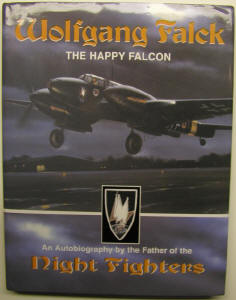|
Eagle Editions Ltd. |
|
Wolfgang Falck, The Happy Falcon by An Autobiography by the Father of the Night Fighters |
|
Reviewed By Chad Richmond, #10346 |
|
|
|
MSRP $45.00 Jerry Crandall has provided us with an autobiography of one of the most influential World War II Aces of all times. Wolfgang Falck only had eight total victories during the war, but his insight into the needs for and of the night fighting force would have great impact on the way the Luftwaffe conducted operations during the course of the war. This book, compiled from personal interviews and tapes made over several years, is not your typical aviation history book designed for modelers. In fact, it has very little value for modelers, except for four color profiles of Colonel Falck’s various aircraft. It is, however, a very fast moving chronicle of 76 years of this remarkable man’s life. Born in 1910, the son of a pastor, Wolfgang Falck grew up during the Great War and the following Depression. It was a hard time for everyone, and Wolfgang’s father moved him around trying to make sure he had the best that was available at the time. He read about the exploits of the great soldiers, airmen and sailors of World War I, and decided it was a naval career for him. However, getting sea sick every time he was on the water soon destined him for the Army and Infantry duty. In 1931 he was accepted for pilot cadet school in Russia. Three years later he was a Lieutenant. Lieutenant Falck began flying Heinkel 51's, He 112's Me 109's, and finally in the summer of 1939, the Me 110. Shortly thereafter, in December, 1939, night fighting was born and the beginning of a career, not as a pilot, but as a developer of tactics and procedures had begun. His extensive planning and development of procedures for use by night fighters soon made Wolfgang Falck known as a brilliant planner and tactician, and made him a valuable asset to the Luftwaffe staff. Falck soon found himself, not in the cockpit, but at the planning tables. He also found himself in the midst of insanity, pomposity, at the highest levels. Through it all, he managed to keep himself free of any controversy and avoided any dealings with anyone associated with the attempt on Hitler’s life in 1944. With the invasion of the Americans from the West and the Russians from the East, Falck found himself in 1945 caught between the two forces with no where to go. Luckily he ended up giving himself up to an American Lieutenant on May 2, 1945. By some stroke of luck, no one followed the procedures they were supposed to, and the captured Luftwaffe Colonel was treated as a “normal” prisoner, and finally released by an American Captain and a Lieutenant and given false papers and sent on his way. They told him to go home, which was unheard of at that time. All high ranking officers were supposed to be turned over to other Allied troops. Thus began a second career. In the years following the war he found himself working for a British supply depot, a chemical company, and finally a playing card company, of which he even became CEO. During tose years, there were annual reunions of Lufwaffe fighter pilots, so he maintained contact with many of his old friends. This was his existence until 1961 when he was offered a position on Germany’s Jagdflieger Board as a consultant for North American Aviation. On January 1, 1962 he reluctantly gave up his position as CEO of the playing card business and took a big chance on his future. In April 1966, he accepted a similar position as a consultant with McDonnell Corporation, which he held until 1987 when he was forcibly retired due to company age policies. Wolfgang Falck was not a high scoring, flamboyant member of the elite Luftwaffe, but his contributions to the planning and execution of night fighter techniques and the development of night fighting equipment made him every bit as valuable, This book is in his own words, and as he says, does not cover all of the things that are already in writing, not politics, but those things that are not already in print. My thanks to Jerry Crandall for this book and to John Noack for the privilege of reviewing it and placing it in my library. |
|
Information, images, and all
other items placed electronically on this site |
